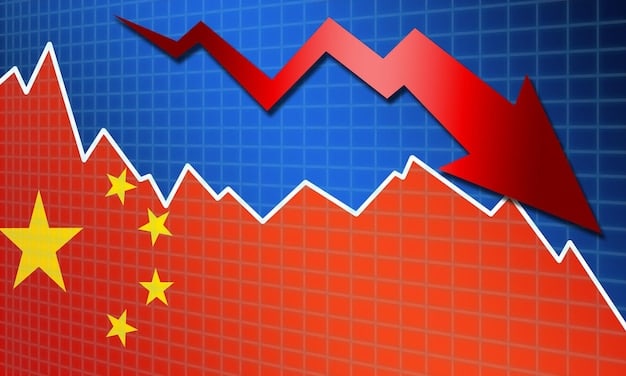US-China Trade Relations: Analysis & Future Projections

US-China Trade Relations: Expert Analysis of the Current Standoff and Future Projections examines the multifaceted economic and political tensions between the United States and China, providing insights into the current trade war, its global impacts, and potential future scenarios based on expert analysis.
The **US-China Trade Relations: Expert Analysis of the Current Standoff and Future Projections** remains a pivotal topic in global economics. This article delves into the intricacies of this relationship, examining the current standoff, its underlying causes, and potential future trajectories with forecasts from industry experts.
Understanding the Historical Context of US-China Trade
The trade relationship between the United States and China has evolved dramatically over the past few decades. Understanding the historical context is crucial to grasp the current dynamics.
The Early Stages of Trade Relations
Initially, trade between the US and China was limited, with the US primarily importing raw materials and exporting finished goods. This dynamic began to shift as China embraced economic reforms.
The Growth of China as a Manufacturing Hub
China’s accession to the World Trade Organization (WTO) in 2001 marked a turning point. It opened up new avenues for trade, transforming China into a global manufacturing powerhouse.
- Rapid industrialization led to a surge in exports to the US, creating a trade imbalance.
- US companies sought to capitalize on lower labor costs in China, shifting production overseas.
- This shift resulted in job losses in the US manufacturing sector, sparking political tensions.
The historical context reveals a gradual but significant shift in economic power. This shift laid the groundwork for the trade disputes that characterize the current relationship.
Key Factors Contributing to the Current Standoff
Several factors have contributed to the current trade standoff between the US and China. These issues range from trade imbalances to intellectual property concerns.

Trade Imbalances and Tariffs
The persistent trade deficit the US has with China has been a major point of contention. Tariffs have been used as a tool to address this imbalance.
Intellectual Property Theft and Cyber Espionage
The US has long accused China of intellectual property theft and cyber espionage, leading to further escalation of tensions.
- US companies report significant financial losses due to the theft of trade secrets.
- Cyberattacks aimed at stealing proprietary information have been attributed to Chinese actors.
- These issues have prompted calls for stricter enforcement and sanctions.
These key factors highlight the complex and multifaceted nature of the trade dispute. Addressing these issues requires a comprehensive approach.
The Impact of the Trade War on Global Markets
The trade war between the US and China has had far-reaching impacts on global markets. Uncertainty and volatility have become the new normal.
Disruptions to Supply Chains
Tariffs and trade restrictions have disrupted global supply chains, forcing companies to re-evaluate their sourcing strategies.
Impact on Specific Industries
Certain industries, such as agriculture and technology, have been particularly hard hit by the trade war.
- US farmers have lost access to key export markets in China.
- Technology companies face restrictions on the sale of products and services.
- These disruptions have led to calls for government intervention and support.
The trade war has created a ripple effect throughout the global economy. Its long-term consequences remain to be seen.
Expert Analysis of the Current Situation
Experts from various fields offer insights into the current state of US-China trade relations. Their analysis provides a nuanced understanding of the situation.

Economic Perspectives
Economists highlight the risks of protectionism and the benefits of free trade. They emphasize the importance of finding common ground.
Political Considerations
Political analysts focus on the geopolitical implications of the trade war. They examine the role of national security and strategic competition.
Geopolitical Experts
Geopolitical experts analyze how the trade standoff affects international alliances and global power dynamics.
- The trade war has strained relations between the US and its allies.
- China has sought to strengthen its ties with other countries in response to US pressure.
- These shifts could have long-term implications for the global order.
Expert analysis underscores the complexity of the situation. It also points to potential pathways for resolution.
Future Projections and Potential Scenarios
Predicting the future of US-China trade relations is a challenging task. However, analyzing current trends can help us envision potential scenarios.
Scenario 1: Continued Confrontation
This scenario assumes that the US and China remain locked in a protracted trade war. Tariffs and restrictions continue to escalate, further disrupting global markets.
Scenario 2: Negotiation and Compromise
In this scenario, the US and China reach a comprehensive trade agreement. Tariffs are reduced, and intellectual property protections are strengthened.
Scenario 3: Decoupling
This scenario involves a gradual decoupling of the US and Chinese economies. Companies shift production away from China, and trade ties diminish.
Future projections depend on the choices made by policymakers in both countries. A willingness to compromise and cooperate could lead to a more stable and prosperous future.
Strategies for Businesses to Navigate the Trade War
Businesses need to develop strategies to navigate the challenges posed by the US-China trade war. Adaptability and innovation are key.
Diversifying Supply Chains
Companies can reduce their reliance on China by diversifying their supply chains. This involves sourcing materials and components from multiple countries.
Investing in Automation
Automation can help companies reduce labor costs and increase efficiency. This can make them more competitive in the face of tariffs.
- Robotics and artificial intelligence can streamline production processes.
- Automation can reduce the need for manual labor, lowering costs.
- Investing in automation can improve long-term competitiveness.
Navigating the trade war requires a proactive and strategic approach. Companies that adapt to the changing landscape will be better positioned for success.
| Key Point | Brief Description |
|---|---|
| 📈 Trade Imbalance | Persistent US trade deficit with China is a major contention. |
| 🔒 IP Theft Concerns | US accuses China of intellectual property theft and cyber espionage. |
| 🏭 Supply Chain Impact | Trade war disrupts global supply chains, affecting industries. |
| 🤝 Negotiation Potential | Future scenarios depend on negotiation and compromise between US and China. |
Frequently Asked Questions
▼
The main reasons include the US trade deficit with China, intellectual property theft concerns, and accusations of unfair trade practices. These issues have led to tariffs and restrictions.
▼
The trade war has disrupted global supply chains, increased market volatility, and impacted specific industries like agriculture and technology. It has created economic uncertainty worldwide.
▼
Potential scenarios include continued confrontation, negotiation and compromise leading to a trade agreement, and a gradual decoupling of the US and Chinese economies. The outcome depends on policy decisions.
▼
Businesses can diversify their supply chains, invest in automation to reduce costs, and adapt their strategies to remain competitive in the face of tariffs and trade restrictions.
▼
Intellectual property theft is a significant issue. The US accuses China of stealing trade secrets and engaging in cyber espionage, leading to calls for stronger protections and enforcement measures.
Conclusion
In conclusion, the **US-China Trade Relations: Expert Analysis of the Current Standoff and Future Projections** is a complex and evolving issue with significant global implications. Addressing the underlying causes of the trade war and finding pathways for cooperation are essential for a stable and prosperous future.





